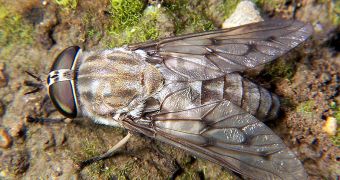A new study published in the journal Molecular Ecology maintains that, when it comes to tracking down endangered and threatened species that live in remote corners of the world, one need not necessarily go looking for them themselves.
Thus, waiting for a bloodsucking fly to locate the species one is interested in is nothing if not a noteworthy idea. This is because, after having found this animal, the fly is quite likely to feed on its blood.
Once this happens, environmentalists and conservationists need only trap the flies, analyze their stomach content and interpret whatever information concerning wildlife distribution in a given area they collected in this manner. Mongabay explains that this is not the first time when scientists make use of a species otherwise frowned upon in order to locate endangered and rarely seen mammals.
However, up until now, only terrestrial leeches have been given the opportunity to assist ecologists in carrying out such green-oriented projects.
Sebastien Calvignac-Spencer, one of the scientists who used flies to learn about wildlife distribution, made a case of how, “The main advantage in using flies is their worldwide distribution.”
“Terrestrial leeches are on the contrary restricted to the tropical belt and even there cannot be found everywhere. For example they do not occur in the two forests [i.e. the Kirindy Reserve in Madagascar and the Tao National Park in Thailand] in which we led our study,” he further elaborated on this topic.
Apparently, the stomach content of just 120 such flies was more than enough for Sebastien Calvignac-Spencer and his fellow researchers to be able to collect DNA samples belonging to a community of primates inhabiting the Tao National Park.
However, the researcher does not shy away from admitting that leeches are better at preserving DNA than bloodsucking flies are, which is why they should not be altogether dismissed.
“As exemplified here, both [the leeches and the flies ] have pros and cons. So we expand the toolbox for conservation biologists but in no case say that it will supersede in all instances those already available,” he said.

 14 DAY TRIAL //
14 DAY TRIAL //